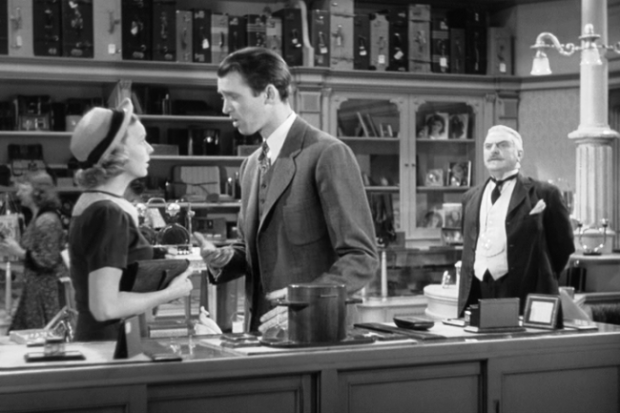 A romantic comedy from classic Hollywood about a little store in Budapest and the people who work there, exemplifies what was known as “the Lubitsch touch.”
A romantic comedy from classic Hollywood about a little store in Budapest and the people who work there, exemplifies what was known as “the Lubitsch touch.”
There are some old movies that I will watch during the holiday season. This year I was reminded that if I were asked to name a film exemplifying the best writing and direction from the classic Hollywood era—there’s one I would think of right away. From 1940, directed by Ernst Lubitsch, it’s The Shop Around the Corner.
The story takes place in Budapest, Hungary, in the late ‘30s. Mr. Matuschek, played by Frank Morgan, owns and operates a small leather goods store with six employees. His most trusted salesman is Alfred Kralik, played by James Stewart. Near the beginning of the film, in a conversation with a co-worker, Kralik reveals that he answered an ad in the paper from a woman who wants a pen pal. He has found himself more and more fascinated by this highly cultured, intelligent, anonymous woman.
The boss, Matuschek, asks Kralik for his advice on purchasing a bunch of cigarette cases that play a song when you open them. Kralik says it’s a bad idea, which annoys the owner. Later that day, a young woman named Clara Novak, played by Margaret Sullavan, comes to the store asking for a job. She’s told that there are no openings, but when she sees a lady customer eying the cigarette box, she quickly uses a combination of charm and guile to persuade the woman, not only to buy the box, but at a higher price than the store owner had been suggesting to Mr. Kralik.
Thus Clara is hired after all. And later in the film, as Christmas approaches, tensions rise in the shop, partly due to some unknown source of irritability in the case of the boss, and also because Clara and Kralik, who is her supervisor, always seem to be quarreling.
You can probably see where this is going. But in any case, the important thing is not so much the plot as the way it’s presented, which is with a graceful, seamless style; fine acting, and a never failing wit. Lubitsch was the master of romantic comedy in classic Hollywood—it even earned him a particular phrase describing his style: the “Lubitsch touch.” The marvelous screenplay is by Lubitsch’s frequent collaborator Samson Raphaelson, which he adapted from an Hungarian play by Miklos Laszlo.
Well, you might think: Jimmy Stewart playing an Hungarian? Well, most of the actors don’t even try to do an accent here. Stewart sounds as American as he always did, as does Sullavan and Morgan. This was just accepted in those days, and it doesn’t make any difference in one’s enjoyment. Hollywood provides the outlines of an illusion, and the audience fills in the rest.
Stewart is wonderful in a part that gives him a lot of amusing lines plus a romantic entanglement that shows his talent off to the best advantage. Now, in other movies, Margaret Sullavan has seemed to me to be sometimes a bit false, but not here. She’s perfect as a woman who does her best to fit in to the little society of the store, but still can’t hide her dismissive attitude toward Stewart’s character. It’s charming and funny. Frank Morgan, as the boss, is actually the pivot around which the story turns. Nowadays we always immediately think of him as the Wizard of Oz, but he appeared in lots of movies, and he was never better than here. There are actually a lot of other characters, each one ridiculous in a different way, and the actors all have a chance to shine. Most of the action takes place during the Christmas season, and this even fits in with the picture’s themes, but it’s different from what we usually think of as a Christmas movie, because it doesn’t get too sentimental. It has sentiment, but it just doesn’t go overboard.
I always smile and laugh and experience delight and even joy when I watch it again. The word “classic” gets thrown around a lot, but The Shop Around the Corner is the real thing.

Barry Jenkins adapts a James Baldwin novel about a black couple who won’t let anything, including an unjust arrest, keep them apart. When we...

Kurosawa’s 1954 epic adventure is a profound cinematic experience. There’s a sports metaphor I’ve heard used, in basketball mostly, when they say that a...

Tells the true story of a death row inmate, played by Jamie Foxx, who fights his unjust conviction with the help of a young...